
“I Needed The Seat”: Teen Leaves Karen Red-Faced After Showing Her Why She Can’t Have Her Seat
Even if a person seems visibly healthy, demanding that they give up their seat—often one that is reserved for disabled people—is not a good idea. In addition to being an impolite thing to do, it can also be challenging for the person in the seat, as they might have a hidden disability.
This redditor with an injury that wasn’t visibly apparent became subjected to such demands while taking the train. A woman approached her and requested that she vacate the seat, but was soon put back in her place after the OP revealed something she didn’t see coming.
Scroll down to find the full story below, where you will also find our interview with the Chief Brand Officer of the Hidden Disabilities Sunflower, Annette Cmela, who was kind enough to answer a few of Bored Panda’s questions.
Some people entitled to seating reserved for disabled people might seem visibly healthy
Image credits: elenakaretnikova2022 / Envato (not the actual photo)
This person was forced to prove that she had the right to use the reserved seating
Image credits: Pixabay / Pexels (not the actual photo)
Image credits: Swimming-Contact6122
Not all illnesses or disabilities are clearly visible
Image credits: Judita Mikalkevičė / Pexels (not the actual photo)
Needless to say, a disabled person using a dedicated seat on a bus or a train shouldn’t have to prove to everyone around that they are entitled to it. However, sometimes situations like that happen, especially when people around them don’t consider that certain disabilities are not visibly apparent and rush to make assumptions.
“There is a general lack of awareness and understanding of the wide range and complexity of non-visible disabilities,” Chief Brand Officer of the Hidden Disabilities Sunflower, Annette Cmela, told Bored Panda. “If you’re living with a non-visible disability, the reality is that your disability often has no visible signs and you may have to repeatedly explain what your disability is and then justify your access needs.”
Some people with invisible—also known as hidden—disabilities might simply not want to cite their medical history to complete strangers. Others, like the OP, can be self-conscious or have other reasons to keep their lips sealed when yet another person is barking at them fueled by assumptions.
In addition to that, they might be discouraged to explain the situation as, according to Cmela, sharing that you have a non-visible disability can lead to negative attitudes or biases. “The fear of discrimination, stigma in the workplace, the likelihood of being treated differently, and other potential negative consequences can mean that people hesitate to share and discuss their condition, needs and experiences openly.”
It’s important to recognize the symbol signaling of a hidden disability—a Sunflower lanyard
Image credits: Kampus Production / Pexels (not the actual photo)
Whether they’re willing to talk about it or not, people with hidden disabilities should not have to justify taking a dedicated seat or using other accommodations. Be that as it may, they can choose to voluntarily display an indication showing that they might require understanding or help from those around them.
One of the ways to do it is by wearing a green lanyard adorned with sunflowers—an internationally recognized symbol signaling a hidden disability. A result of the Hidden Disabilities Sunflower initiative, the lanyard “doesn’t focus on the non-visible,” Annette Cmela explained. “It triggers a simple question, ‘How can I help you?’ to focus on the support or understanding someone might need.”
Cmela pointed out that by wearing the Sunflower lanyard, the person is letting those around them know that they might need extra help, understanding, or more time doing certain things. That’s why it’s important to raise awareness in regards to the Sunflower lanyard and hidden disabilities in general. So people like the OP don’t have to roll up their trouser legs, sleeves, or engage in storytelling of personal details to receive understanding.
Teen answered questions in the comments
Many people didn’t consider the teen a jerk in the situation
Some believed that there was no need to delay informing the woman of the disability
Poll Question
Thanks! Check out the results:
Stunned by how many are saying she's the arsehole, or criticising her. That woman had no right to to behave the way she did. Once the teen stated she needed the seat, that's it..conversation over.
Beyond saying “I’m disabled” or “I need the seat,” there should be nothing else needing to be said. People aren’t entitled to know the medical history of strangers. And lots of medical conditions are invisible. Do they expect people to talk candidly on the bus to strangers about their bowel conditions or cancer they are suffering from? Anybody questioning another’s disability is automatically TA to me. And everybody saying YTA are TA for expecting to be told people’s private medical diagnoses.
Load More Replies...Op didn’t need to explain her disability that’s BS, she apologized and said she needed it 2x, hopefully the other lady learned a lesson about judging a book by its cover
There are so many people who park in disabled bays because they are closer, or teens sitting in disabled seats because they don't care if someone else is in pain. A simple "Yes, I do have a disability" is acceptable, because sitting in that seat is a declaration that she has a disability. No need for an explanation, and if one was demanded, then that would have been a subject to post about. There's no discussion about the woman ALSO having a disability, and being justified about asking an apparently able bodied teen to move. A little bit more communication and openness would have solved this.
Load More Replies...NTA, but "I need the seat" isn't clear, because people don't actually listen that closely when they start off from the position of thinking you don't look disabled. Try "I'm disabled and I need this seat." or "I have an invisible disability, and need to sit." You aren't required to tell her the details. On a side note, maybe ask for some therapy or do some self-help reading to help you with self acceptance and body image? You deserve to love and be comfortable with your body. Not so you can justify yourself to entitled strangers, just so you can be comfortable in yourself. You're going to be in this body your whole life, you deserve to be able to look at it in the mirror without distress.
I have an invisible disability. If someone questions me on using disabled areas I tell them just that, I don't say what it is. However, if someone tells me to move in an entitled manner and starts the whole "conversation" off on the wrong foot, I'm likely to pick up on that and react in a similar fashion.
Load More Replies...Stunned by how many are saying she's the arsehole, or criticising her. That woman had no right to to behave the way she did. Once the teen stated she needed the seat, that's it..conversation over.
Beyond saying “I’m disabled” or “I need the seat,” there should be nothing else needing to be said. People aren’t entitled to know the medical history of strangers. And lots of medical conditions are invisible. Do they expect people to talk candidly on the bus to strangers about their bowel conditions or cancer they are suffering from? Anybody questioning another’s disability is automatically TA to me. And everybody saying YTA are TA for expecting to be told people’s private medical diagnoses.
Load More Replies...Op didn’t need to explain her disability that’s BS, she apologized and said she needed it 2x, hopefully the other lady learned a lesson about judging a book by its cover
There are so many people who park in disabled bays because they are closer, or teens sitting in disabled seats because they don't care if someone else is in pain. A simple "Yes, I do have a disability" is acceptable, because sitting in that seat is a declaration that she has a disability. No need for an explanation, and if one was demanded, then that would have been a subject to post about. There's no discussion about the woman ALSO having a disability, and being justified about asking an apparently able bodied teen to move. A little bit more communication and openness would have solved this.
Load More Replies...NTA, but "I need the seat" isn't clear, because people don't actually listen that closely when they start off from the position of thinking you don't look disabled. Try "I'm disabled and I need this seat." or "I have an invisible disability, and need to sit." You aren't required to tell her the details. On a side note, maybe ask for some therapy or do some self-help reading to help you with self acceptance and body image? You deserve to love and be comfortable with your body. Not so you can justify yourself to entitled strangers, just so you can be comfortable in yourself. You're going to be in this body your whole life, you deserve to be able to look at it in the mirror without distress.
I have an invisible disability. If someone questions me on using disabled areas I tell them just that, I don't say what it is. However, if someone tells me to move in an entitled manner and starts the whole "conversation" off on the wrong foot, I'm likely to pick up on that and react in a similar fashion.
Load More Replies...
 Dark Mode
Dark Mode 

 No fees, cancel anytime
No fees, cancel anytime 







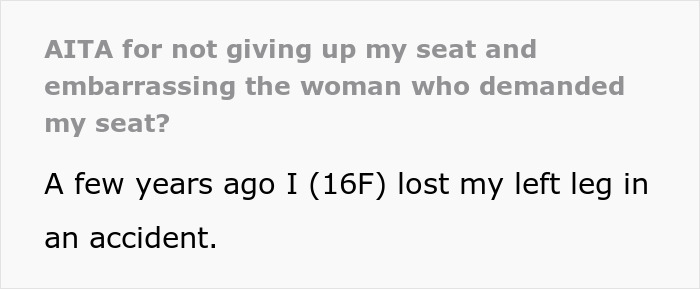
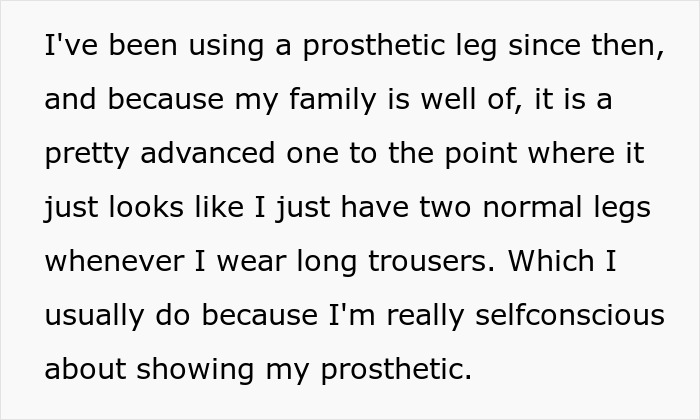
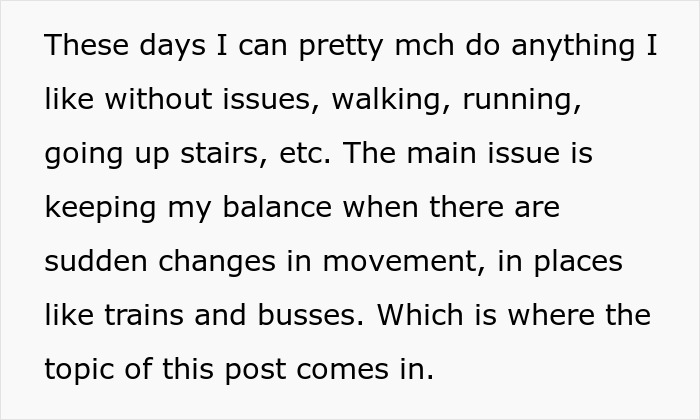
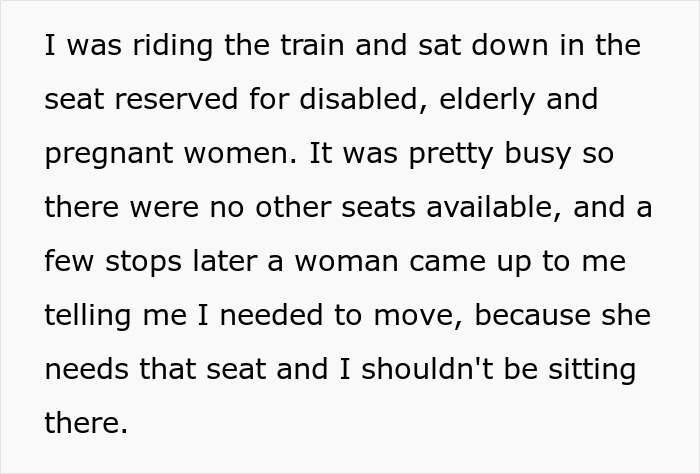
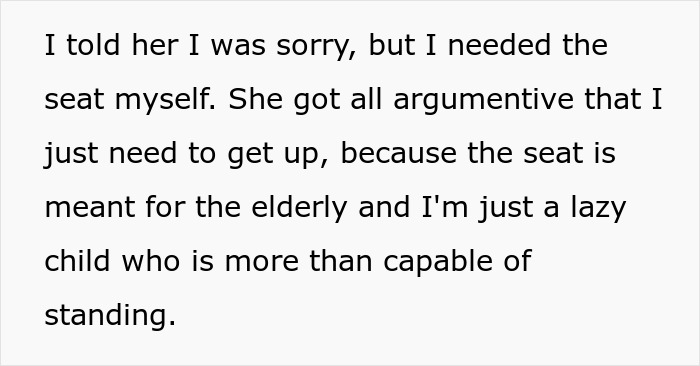

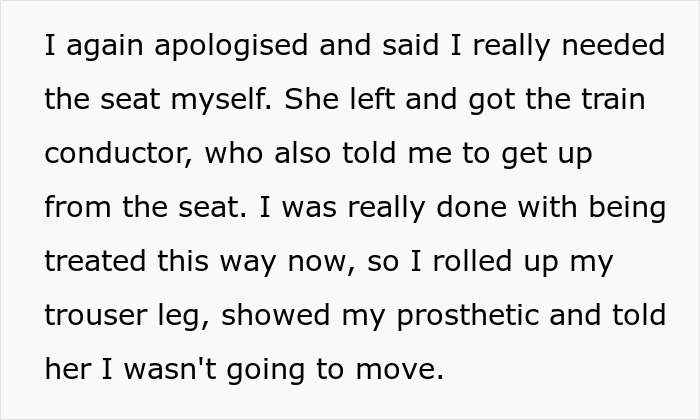

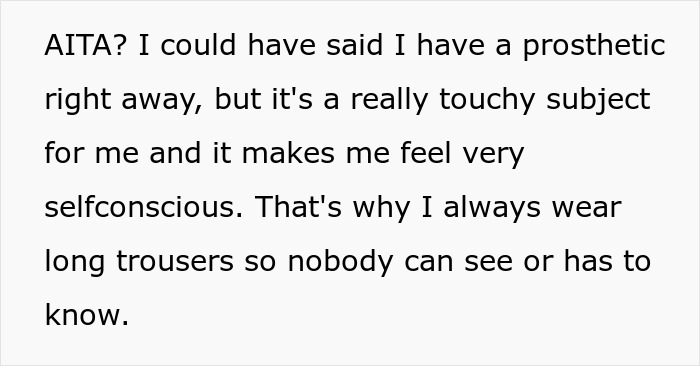
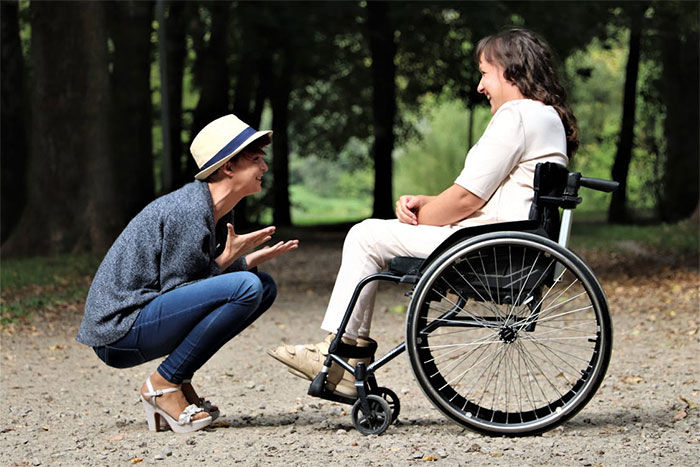
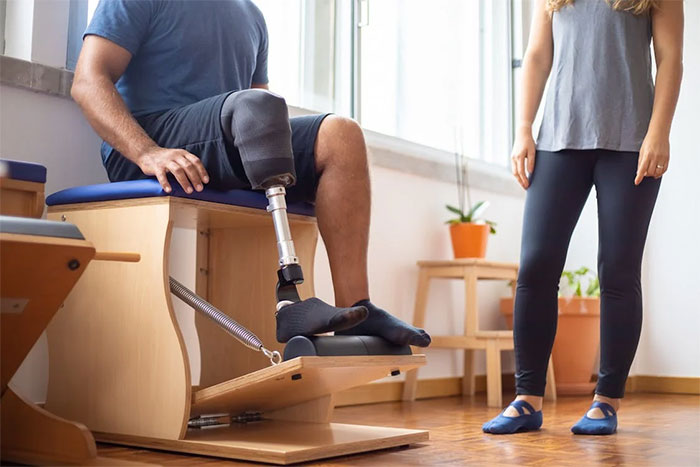
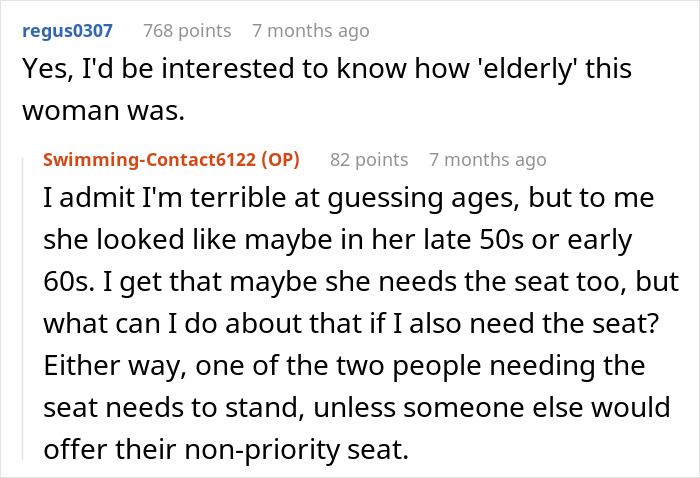
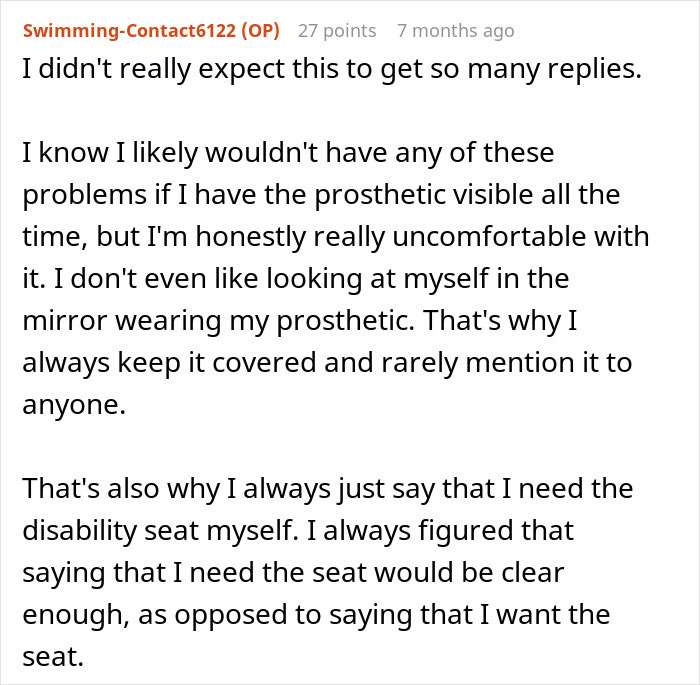
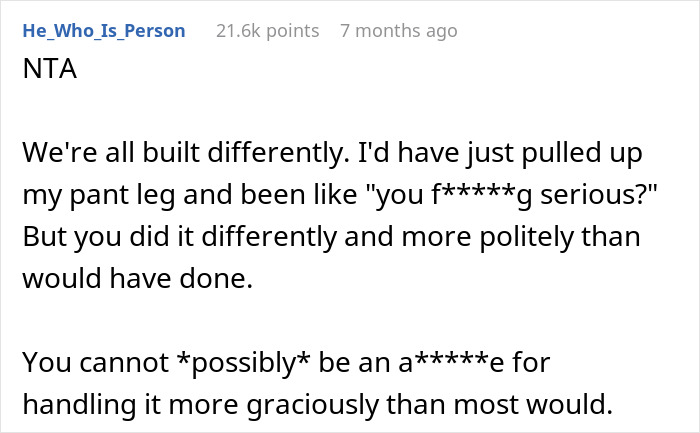
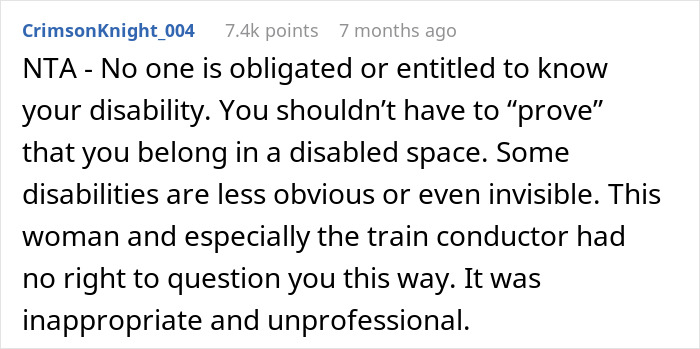

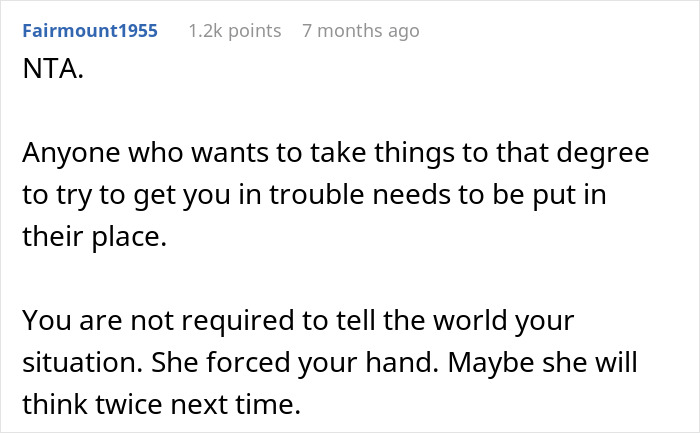
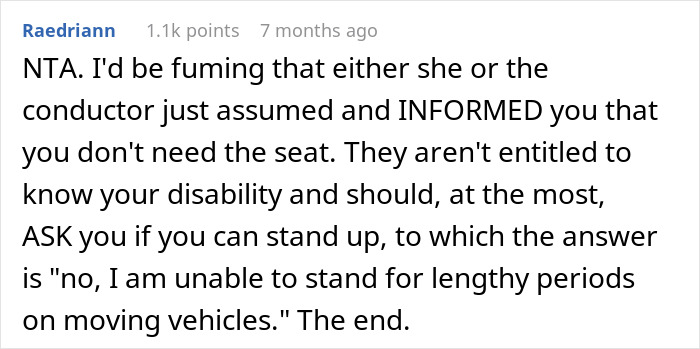
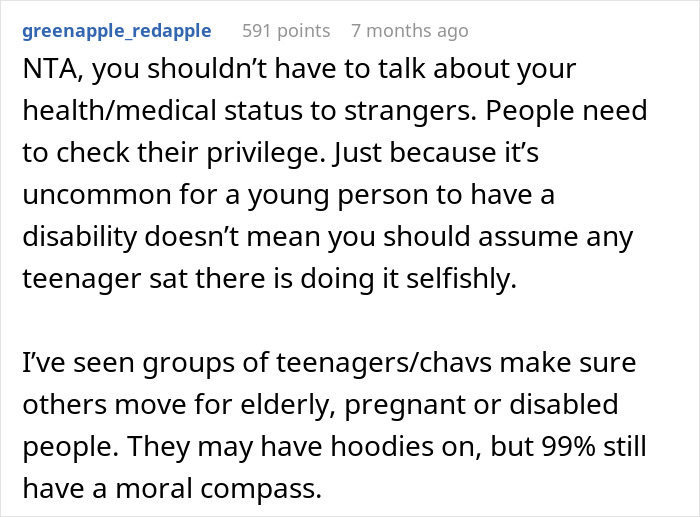
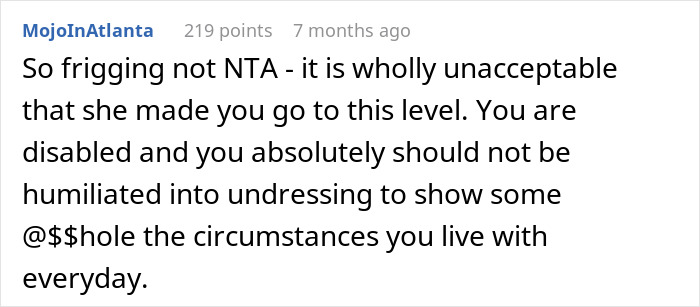
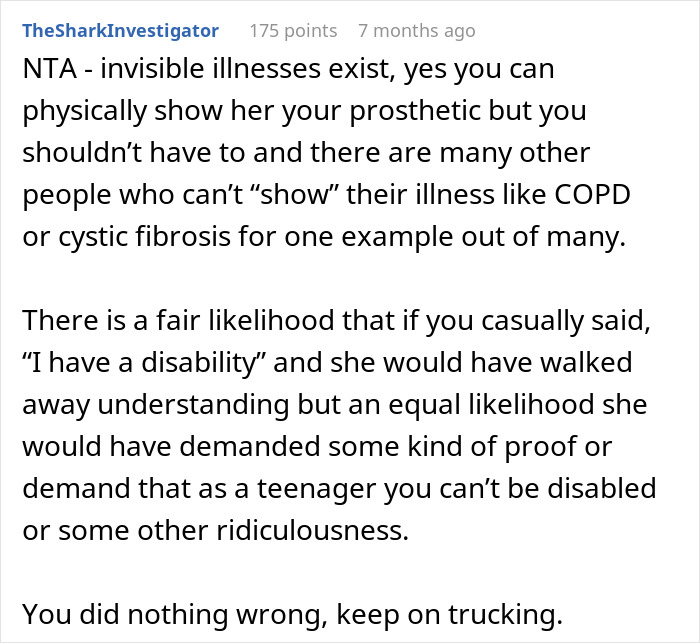
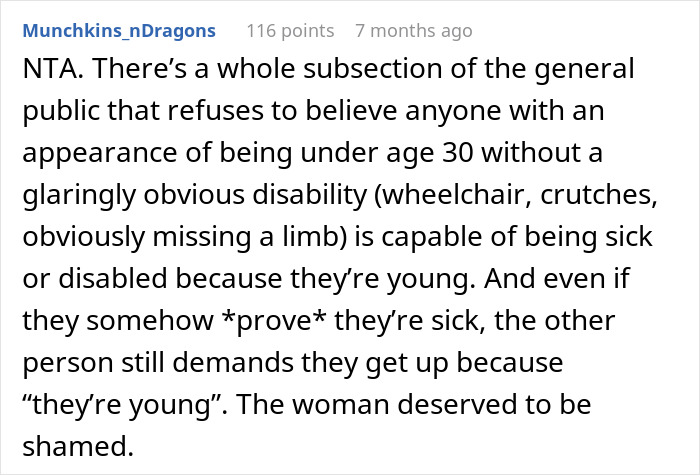
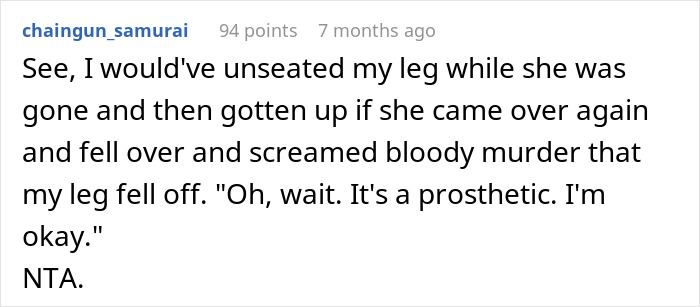


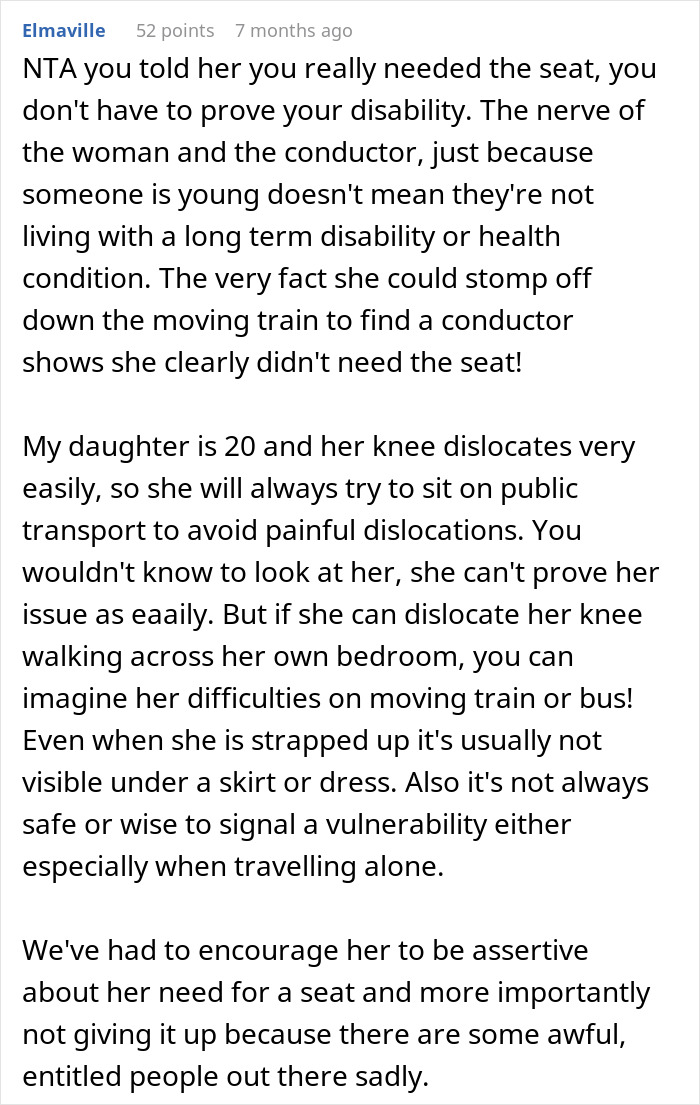
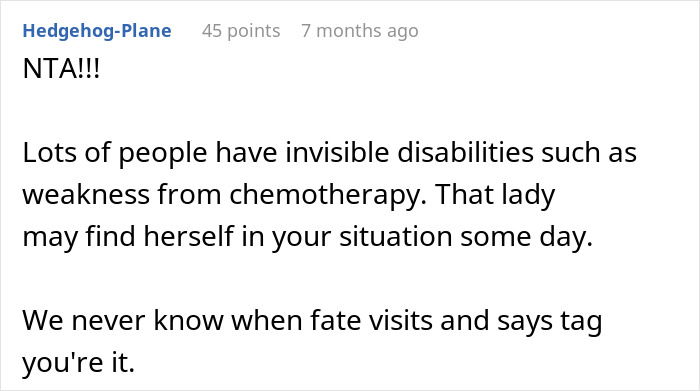
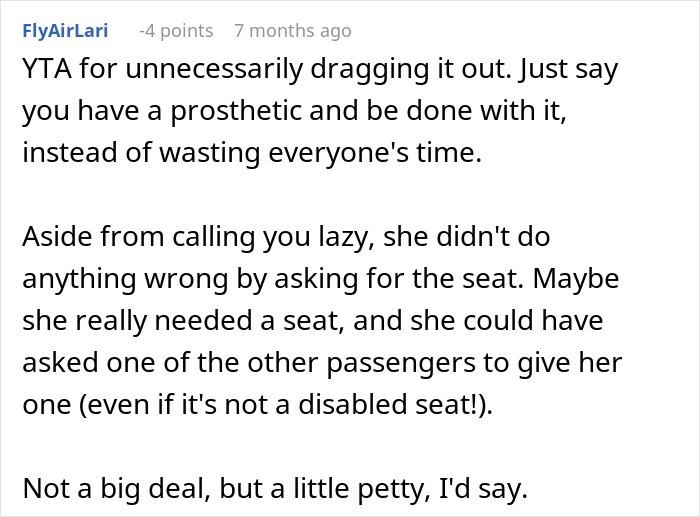

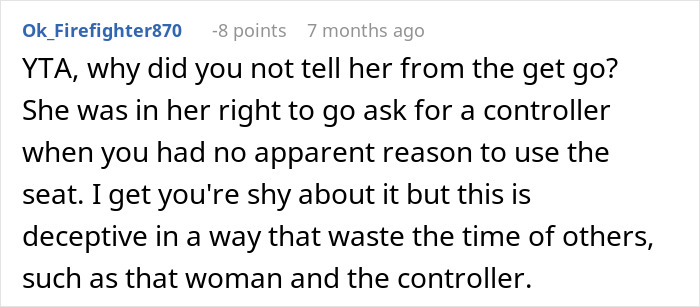













































72
137